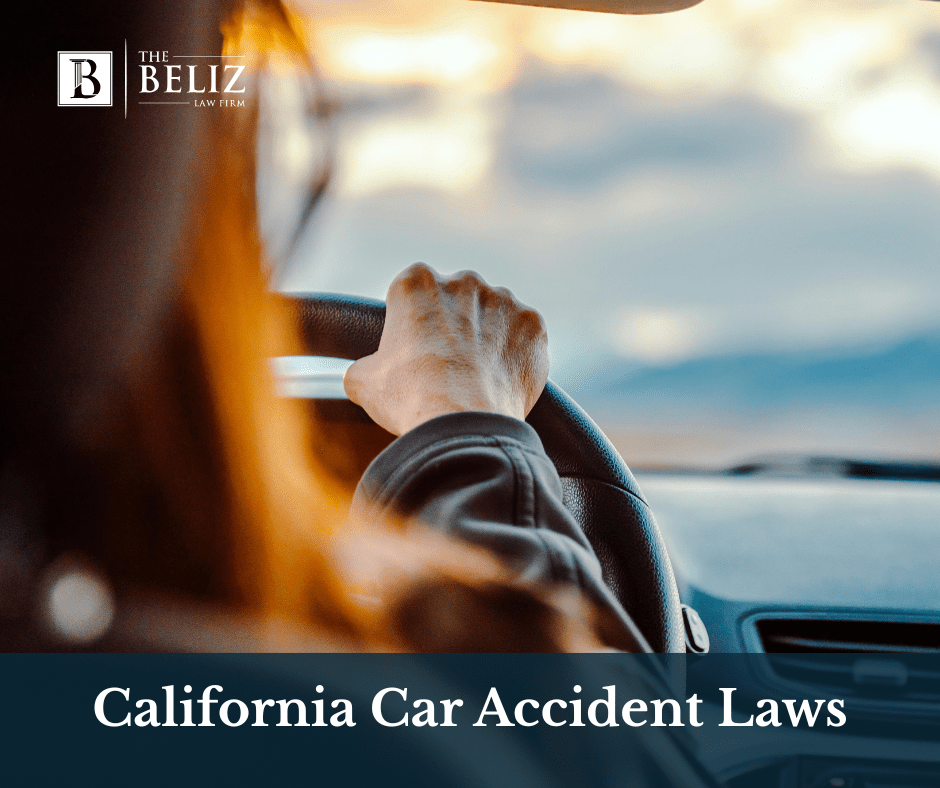When you get in a car crash in California, your life is immediately shaped by California car accident laws, whether you know it or not. California car accident laws govern whether you can receive compensation after a crash. These laws also help determine how much you may receive for medical care for your injuries, repairing or replacing your car, and missing days on the job, among other losses.
Insurance companies often try to use their deep knowledge of the law against you to reduce or eliminate your payout. That’s where we come in. At the Beliz Law Firm, we bring our extensive legal experience to bear for you and use the law to help you get justice.

What Compensation Can You Receive After a Car Accident?
The damages you may recover under car accident laws in California fall into three main categories: economic, noneconomic, and, in limited cases, punitive.
Economic Damages
Economic damages cover things like:
- Medical bills,
- Rehabilitation costs,
- Lost wages,
- Loss of earning capacity, and
- Property damage.
Medical damages often go far beyond the initial emergency room visit. Long-term rehabilitation, physical therapy, prescription medications, and surgeries may be required months or years after the crash. In cases involving catastrophic injuries such as traumatic brain injuries or spinal cord damage, the costs can extend for a lifetime.
Lost wages include the income you miss immediately and the long-term loss of earning capacity if your injuries prevent you from returning to your previous occupation. Courts and insurers may rely on vocational experts to determine what kind of work, if any, you can perform after the accident.
Noneconomic Damages
Noneconomic damages include:
- Pain and suffering,
- Emotional distress,
- Loss of enjoyment of life, and
- The impact the accident has on your relationships.
The impact of an accident on your relationship is often called “loss of consortium.” This refers to the harm your spouse or partner suffers when an accident diminishes companionship, intimacy, and household contributions. In addition, compensation may be available for household services if you can no longer perform tasks such as cleaning, cooking, or caring for children, and your family must hire outside help.
Punitive Damages
In rare cases involving reckless or intentional conduct, you may also pursue punitive damages designed to punish the wrongdoer.
Every case is unique, and the value of your claim depends on the extent of your injuries, the impact on your life, and the available insurance coverage. We work closely with clients to develop a comprehensive picture of how the accident has affected them now and in the future.
Who Has to Pay After a Crash According to California Car Accident Laws?
Two areas of automobile accident law largely dictate how compensation is awarded after a car crash in California: at-fault insurance and comparative negligence laws.
At-Fault System
California follows an at-fault system, which means the driver responsible for causing the accident is financially responsible for the resulting damages. Unlike no-fault states, where each driver turns to their own insurance first, the injured party has the right to pursue a claim against the at-fault driver’s insurance in California.
Pure Comparative Negligence
California also applies the rule of pure comparative negligence. If you are partially at fault, your recovery is reduced by your percentage of fault. For example, if your damages total $100,000 and you are 20 percent at fault, you can still recover $80,000. This system ensures you are not barred from recovery simply because you share some blame.
Determining Fault
Courts and insurers look at several factors to determine fault. Police reports often carry weight because they document initial observations at the accident scene. Still, they are not the final word. Witness statements, photographs, video footage, and physical evidence such as skid marks or vehicle damage all play a role in reconstructing what happened. Traffic violations can also support a finding of negligence. If a driver ran a red light, was speeding, or was driving under the influence, these violations often establish “negligence per se”, meaning the violation itself serves as proof of fault.
Complex cases involving California car accident laws may require expert witnesses, such as accident reconstruction specialists, to explain how the collision occurred. We regularly work with these professionals to ensure that the facts are clear and that fault is assigned correctly.
What Are the Car Insurance Laws in California?
To understand how you get compensation in California’s at-fault system, you have to dive a little deeper into car insurance laws in California.
Minimum Liability Coverage
All drivers in California must carry liability, or “at-fault”, insurance. The minimum required coverage is:
- $30,000 for injury or death of one person,
- $60,000 for injury or death of more than one person, and
- $15,000 for property damage.
Our first step as your attorney is to pursue compensation through that insurance.
Uninsured/Underinsured Motorist Coverage
If you have uninsured/underinsured motorist coverage as part of your car insurance, we can also pursue compensation under that policy. Uninsured/underinsured motorist coverage should provide compensation if the driver who hit you didn’t have car insurance, or if their car insurance doesn’t cover the full extent of your damages.
If You Didn’t Have Minimum Liability Coverage at the Time of the Crash
Let’s say you were in a crash caused by another driver. You might think that the fact that you didn’t have your own car insurance, like you are legally required to, shouldn’t impact your claim. After all, the at-fault driver is the one whose insurance has to pay, not yours.
However, under California law, you are still penalized in a way. If you do not have valid insurance, you may be limited in your ability to recover noneconomic damages, such as pain and suffering, even if the other driver was at fault. This is known as the “no pay, no play” rule. Not being able to recover noneconomic damages can lower the total compensation you receive.
What Are Some Ways Insurance Companies Try to Limit Your Compensation?
Insurance companies have their own interests, and those interests rarely align with yours. Adjusters may sound sympathetic, but their job is to minimize payouts. Common tactics include:
- Asking for recorded statements designed to make you admit fault,
- Offering quick settlements that undervalue your claim, and
- Delaying the process to wear you down.
If these sound familiar, reach out to us as soon as possible. At the Beliz Law Firm, we believe you should not have to fight insurance companies alone, especially while recovering from injuries.
Once we become your attorney, we handle communication with insurers, gather medical records, calculate future care costs, and negotiate aggressively for a fair settlement. If an insurance company refuses to make a reasonable offer, we are prepared to take the case to trial.
What Should You Do Immediately After a Car Accident?
The moments after an accident are chaotic, but the steps you take can protect both your health and your legal rights.
- Call 911 and seek medical attention, even if you feel fine, because injuries sometimes appear later;
- Report the accident to law enforcement and ensure a report is created;
- Exchange information with the other driver, including license, registration, and insurance details;
- Take photographs of the scene, vehicles, and any visible injuries; and
- Notify your insurance company, but avoid giving detailed statements before speaking with an attorney.
Following these steps creates a record of what happened and strengthens your position if a dispute arises later.
What Do California Auto Accident Laws Say About Reporting a Crash?
After an automobile accident, California law requires drivers to report certain crashes, beyond just having a police officer write a report on the scene. You must submit a written report to the California Department of Motor Vehicles within 10 days if any person is injured, killed, or if property damage exceeds $1,000. Failing to report an accident properly can lead to driver’s license suspension and complicate insurance claims.
At the Beliz Law Firm, we can handle these tasks for you if you need us to. This California reporting law is one of the many reasons you should consider reaching out to us immediately after a car accident.
Contact Us Today
At the Beliz Law Firm, we have dedicated our practice solely to personal injury law since 2006, and we opened our firm in 2011 with the mission of providing personal attention to each client. We pride ourselves on one-on-one communication with your attorney, not just staff. Our small firm approach allows us to know our clients by name and circumstance, while our results demonstrate that we can stand toe-to-toe with the largest insurance companies.
We guide you through each step of the process, from reporting requirements and insurance claims to negotiations and, if necessary, courtroom litigation. We focus exclusively on personal injury law, meaning every strategy we employ is grounded in years of experience with cases like yours.
If you or a loved one has been injured in a California car accident, we invite you to contact us today. We are here to answer your questions, explain your rights, and work to protect your recovery from day one.
- Resources:
- Accident reports, Cal. Veh. Code. §16000, Link.
